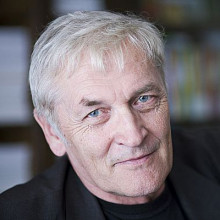Polish literature

Bohdan Zadura
Born in Pulawy, 1945. He studied political science at the University of Warsaw, contributes regularly to the monthlies Tworczosc and Literatura na Swiecie, and has published in most Polish literary and cultural journals. He has won numerous awards, including the 1994 Pietak prize.
He has also written prose and literary criticism as well as translating from the Russian, Hungarian and English. His early work was regarded as neoclassical, and his poetry is elegant and shows an abundant facility with traditional verse forms. Symptoms of aesthetic change marked the 1983 collection Disembarking on Land, but his true breakthrough volume was Old Acquaintances, which broke away from his regular, formally disciplined traditional lyrics (and especially the sonnets for which he had a particular liking). His lyric subjects seem close to the everyday experience of the poet. He treats the reader as an equal partner in the search for elusive senses and sees poetry as a way of communicating something important about existence. Zadura's present-day position as a teacher and master for many young poets is founded on the collection Silence. Its unusual opening section (Verses Written in a Fever) and the long poem Silence rely on the fact that the verse flirts with kitsch at every step (rhyme, rhythmical balance, meter) while never permitting kitsch to get out of control or gain the upper hand. Reference to the tradition of the digressive poem permits Zadura not only to deliver a mythologized history of Martial Law, but above all to narrate his private history of that era. As a result, we have poems that begin with facts, pain, ecstasy and tears, and then go on to transform themselves into suggestive visions of those times. The verse is literal because it exhibits a simple faith in everyday words, and elliptical because it creates masterful and arresting poetical compositions on the basis of individual phrases. The final cycle of poems in Silence (Stolen and Given) offers works arising from the margins of the poet's experience as a translator. Here is where the lyric form is brought closest to prose - here, too, is the root of Zadura's most powerful influence on the sensibilities of poets who began to write in the 1990s.
The word 'time' occurred very frequently in my first volumes. Similarly, in thinking about what was happening to me, I often used the concept 'by accident.' I sometimes identified the accidental with its opposite - with destiny. What happens by accident can also happen as a work of providence.
BIBLIOGRAPHY
- W krajobrazie z amfor, Warszawa: Czytelnik, 1968.
- Podróż morska, Warszawa: Czytelnik, 1971.
- Pożegnanie Ostendy, Warszawa: Czytelnik, 1974.
- Małe muzea, Warszawa: Czytelnik, 1977.
- Zejście a ląd, Warszawa: Czytelnik, 1983.
- Starzy znajomi, Warszawa: Czytelnik, 1986.
- Prześwietlone zdjęcia. Poezje i przekłady, Lublin: Wydawnictwo Lubelskie, 1990.
- Cisza, Poznań: a5, 1994.
- Kaszel w lipcu, Wrocław: Pomona, 2000.
- Więzień i krotochwila, Kraków: Zielona Sowa, 2001.
- Ptasia grypa, Legnica: Biuro Literackie, 2002.
- Między wierszami, Legnica: Biuro Literackie, 2002.
- Kopiec kreta, Wrocław: Biuro Literackie, 2002.
- Stąd: wiersze puławskie, Puławy: Towarzystwo Przyjaciół Puław, 2002.
- Wiersze zebrane tom 1-2, Wrocław: Biuro Literackie, 2005.
- Wszystko, Wrocław: Biuro Literackie, 2008.
- Nocne życie, Wrocław: Biuro Literackie, 2010.
- Zmartwychwstanie ptaszka, Wrocław: Biuro Literackie, 2012
- Kropka nad i, Wrocław: Biuro Literackie, 2014
TRANSLATIONS
Belarussian:
- Truny z Ikei [Trumny z Ikei], trans. Andrzej Chadanowicz, Mińsk: Logwinaj, 2016
Hungarian:
- Éles határok [wybrane wiersze], Budapest: Magyar Napló, 2005.
Spanish:
- in anthology: 101 (6 poetas polacos contemporáneos), trans. Mauricio Barrientos, Maciej Ziętara, Santiago de Chile: RiL editores, 2008
- Najgirsze pozady [Poezje wybrane], trans. Andrij Ljubka, Czerniowce: Knigi XXI, 2015
Ukrainian:
- Poet [wiersze zebrane], Charków: Folio, 2007